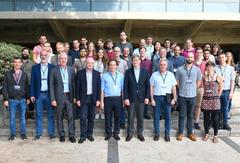URL: https://www.desy.de/news/news_search/index_eng.html
Breadcrumb Navigation
DESY News: Kick-off for Graduate School for Multimessenger Astronomy
News
News from the DESY research centre
Kick-off for Graduate School for Multimessenger Astronomy
The International Helmholtz-Weizmann Graduate School for Multimessenger Astronomy was opened with a festive ceremony in Israel. The program, in which the Israeli Weizmann Institute of Science, the Humboldt University of Berlin and the University of Potsdam have joined forces with DESY, is funded by the Helmholtz Association of German Research Centres with 1.8 million euros. The school will initially start with 17 doctoral students, eight of whom are currently at DESY and nine at the Weizmann Institute in Rehovot.

Otmar D. Wiestler (President of the Helmholtz Association, 6th from left), Helmut Dosch (Chairman of the DESY Board of Directors, 3rd from left), Christian Stegmann (DESY Director for Astroparticlephysics, 2nd from left) and Daniel Zajfman (President of the Weizmann Institute of Science, 4th from left) formally opened the International Helmholtz-Weizmann Research School for Multimessenger Astronomy together with the speakers Marek Kowalski from DESY (5th from left) and Eli Waxman from Weizmann Institute of Science (7th from left), the principal investigators and the graduate students. Credit: Weizmann Institute of Science, Itai Belson
Multimessenger astronomy is the term used to describe the observation of the universe by various messengers such as light, particles and gravitational waves. For example, the neutrino telescope IceCube in Antarctica has detected high-energy particles from an active galaxy that could also be observed with radio, X-ray and gamma telescopes. And the LIGO observatory was able to receive gravitational waves from a colliding pair of neutron stars, which could also be explored at different wavelengths of electromagnetic radiation. The combination of such observations provides insights into high-energy phenomena such as stellar explosions and cosmic particle accelerators that cannot be obtained with a single type of cosmic messenger.
“Multimessenger astronomy is drawing a fascinating new picture of the cosmos,” says DESY's Director of Astroparticle Physics, Christian Stegmann. “This still young, rapidly developing discipline of astrophysics urgently needs specialists who we want to train with the doctoral school.” The graduate school is to form the foundation stone for structured doctoral training in the field of astroparticle physics at DESY and also strengthen the partnership with the Weizmann Institute of Science in Israel.
“The Multimessenger School offers the first targeted training for doctoral students in this field,” emphasizes initiator Marek Kowalski, a Lead Scientist at DESY. “The programme brings together experts for the various messengers and combines the experience of scientists from experiment and theory. From optical light to hard gamma radiation and from neutrinos to gravitational waves, we cover all aspects. This offers students an outstanding starting position in future projects of multimessenger astronomy.”
A longer research stay in the respective partner country is planned within the framework of the doctoral school in order to gain international experience at an early stage. Joint workshops for all students will ensure a strong network.
Further reading: https://www.multimessenger-school.de/



